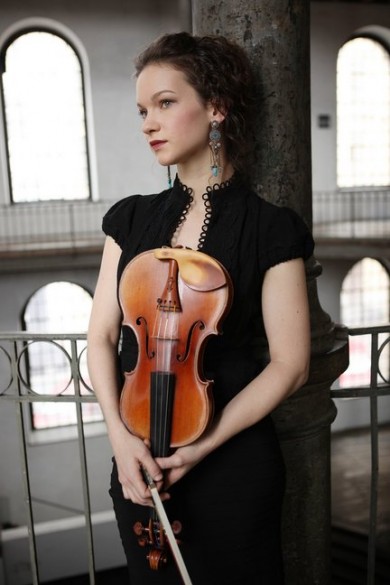Hilary Hahn delivers memorable Bach and a dozen new works in rare local appearance

Hilary Hahn performed a wide-ranging recital Sunday night at the Broward Center in Fort Lauderdale. Photo: Peter Miller
In a rare South Florida appearance, the acclaimed violinist Hilary Hahn gave a concert Sunday that shook up the musty conventions of the classical recital.
The concert at the Broward Center for the Performing Arts in Fort Lauderdale was the last stop on a North American tour in which Hahn and piano accompanist Valentina Lisitsa introduced 13 new encores written for the violinist as part of a two-year project to commission short works from leading composers. The concert — the first in the Broward Center’s 2011-12 classical series — sprinkled sets of these pieces throughout the program, providing a welcome change from the typical violin recital’s procession of sonatas.
Despite being called encores, most of these works didn’t offer the sort of fizzy virtuosity or memorable melody typically provided by post-program bonbons. A large number took the same wistful, ghostly, enervated tone — saying something, possibly, about the times we’re living in. Many of the composers seemed fascinated by the violin’s ability to produce harmonics, glassy, flute-like notes attained by just touching the finger to the string.
Somei Satoh’s Bifu, which opened the concert, was a pensive melody over a restless accompaniment in the piano. Nico Muhly’s Two Voices offered a work of striking musical tension, in which the violin performs increasingly agitated jumps between strings over a repeated note in the piano.
There were several departures from the meditative tone of the majority of these works, although even the pieces that called for virtuosity tended to be quieter, less flashy and more inward looking than the old-fashioned encores of the past.
Jennifer Higdon’s Echo Dash was a rush of notes — and one of the few of these works that gave the pianist much to do. Christos Hatzis’ Coming To starts off in the otherworldly mode that predominated but then gained energy with bursts of chords and fast passagework.
Max Richter’s Mercy departed from the single mood offered by most of these pieces, taking the form of a musical journey from tentative opening notes. Avner Dorman’s Memory Games was a jazzy, rhythmic burst of virtuosity for both violin and piano, with a repeated motif that got more and more frantic as it gained energy. Einojuhani Rautavaara’s Whispering was a study in quiet virtuosity, with rapid triplet notes undulating from the violin.
The sprinkling of short pieces throughout the program made the large works easier to appreciate. Beethoven’s Violin Sonata No. 2 received a spirited performance that gave Lisitsa a chance to go beyond the accompanist’s role, with an agile, strongly marked account.
For sheer violinistic prowess and musical grandeur, nothing Sunday evening beat Hahn’s performance of Bach’s Sonata No. 1 in G Minor for unaccompanied violin. Although Bach’s solo violin works were composed nearly 300 years ago, they remain demanding tests of a violinist’s technique and musicianship.
The performance showed off Hahn’s excellent intonation, extremely clean playing and natural style of phrasing. She delivered a majestic account of the opening Adagio. The difficult polyphony of the fugue — which requires the violinist to handle three voices at once — came off as effortless and harmonically rich, with an underlying dramatic structure that gave great power to the movement’s climactic passages. The concluding Presto was a whirlwind of notes that never lost shape.
Posted in Performances
Leave a Comment
Mon Nov 7, 2011
at 11:14 am
No Comments






